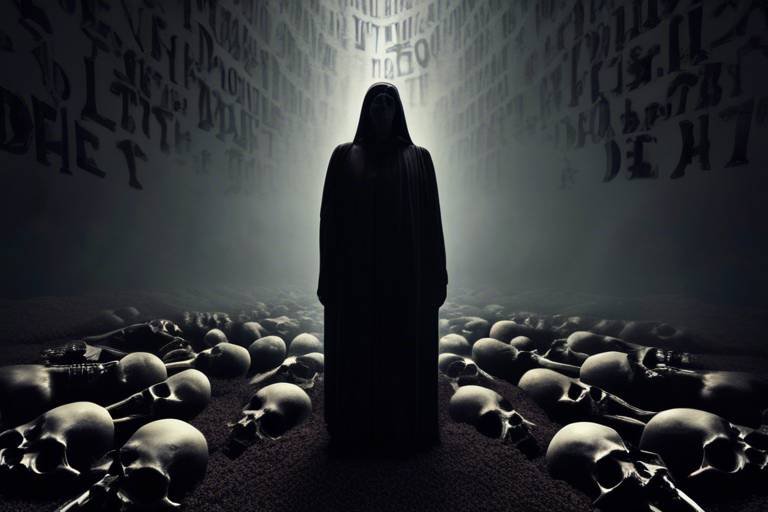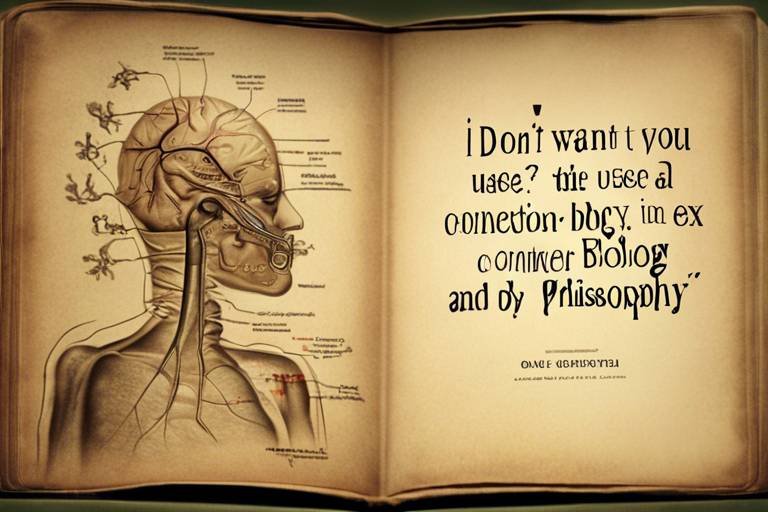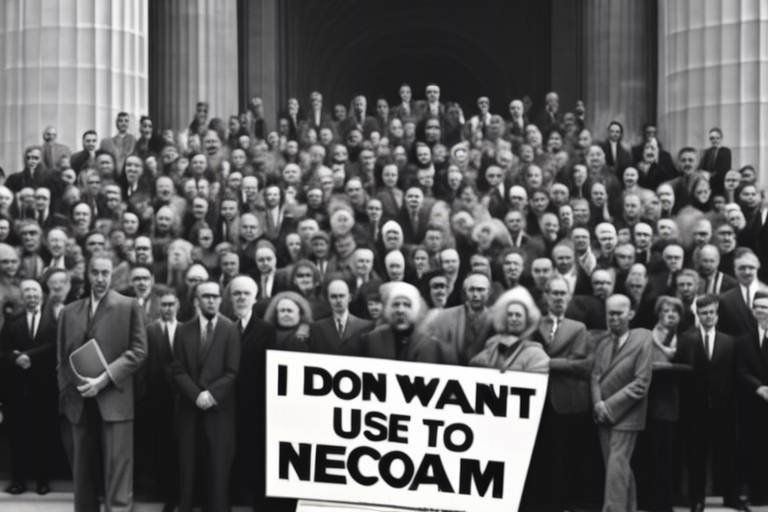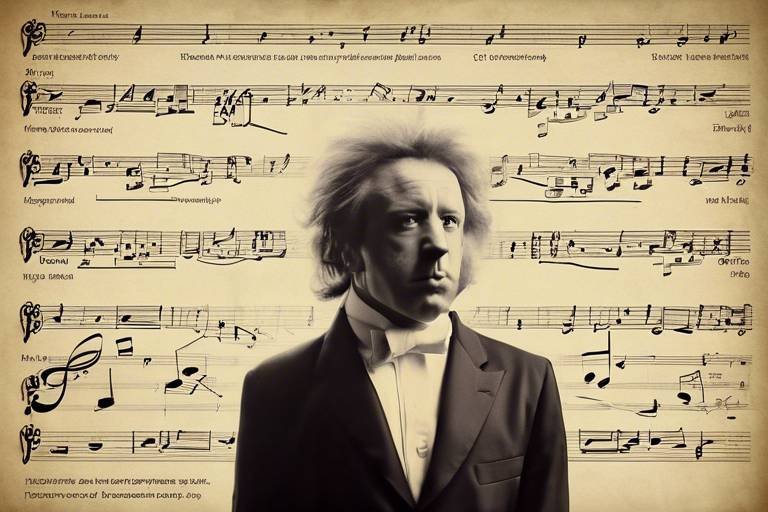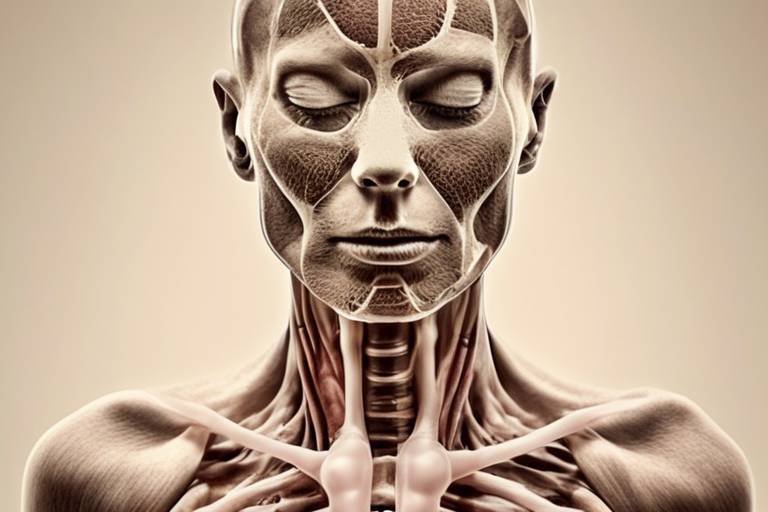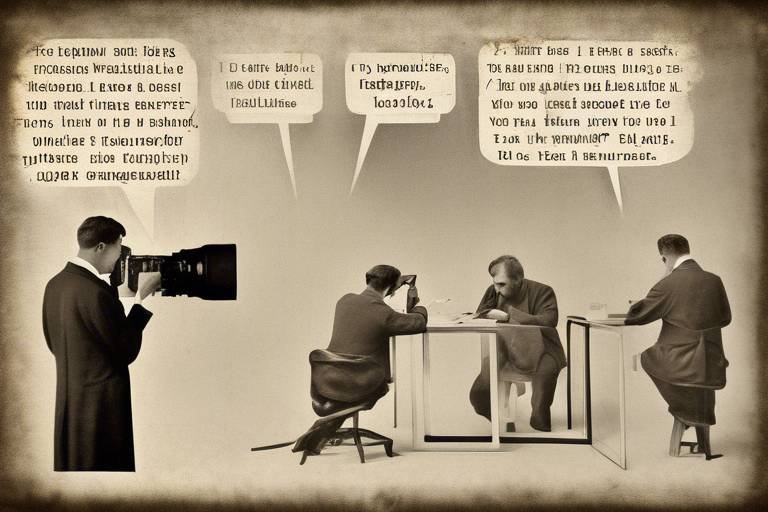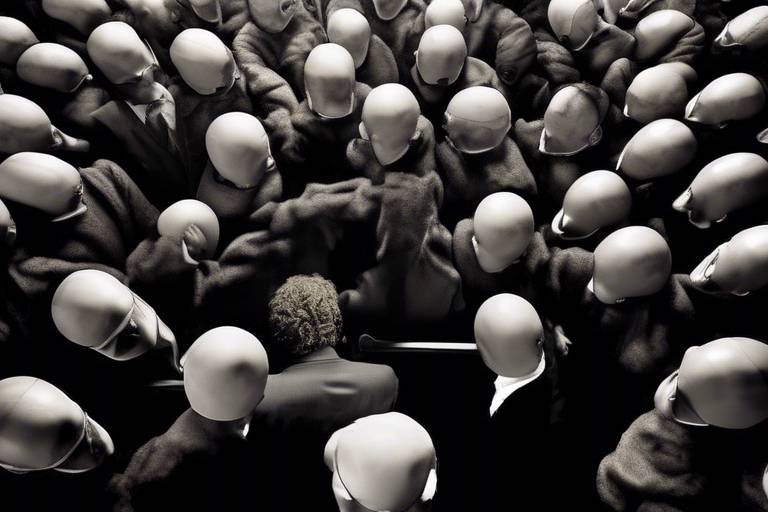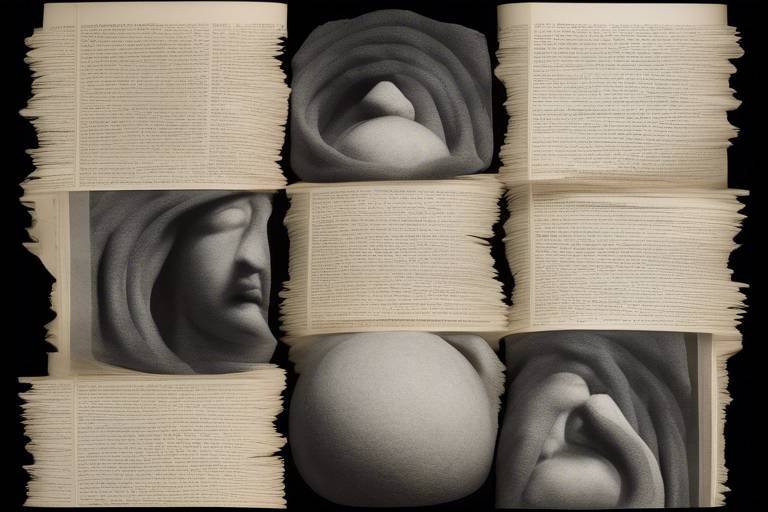Exploring the Philosophical Concept of Death
Death—it's a word that sends shivers down our spines, yet it’s an inevitable part of our existence. Philosophers, theologians, and thinkers have grappled with the concept of death for centuries, trying to unravel its complexities and implications. Why do we fear it? What does it mean for our lives? And how does it shape our understanding of existence itself? This article delves into the multifaceted philosophical perspectives on death, examining its implications, meanings, and the existential questions it raises about life, existence, and the human condition.
At its core, the philosophical exploration of death challenges us to confront our mortality. It forces us to reflect on our values, our beliefs, and ultimately, our purpose. Consider this: if life is fleeting and death is certain, how should we live? Should we cling to every moment, or should we embrace the idea that our time is limited? These questions are not just abstract musings; they are deeply personal inquiries that can transform our approach to life.
Throughout history, various cultures and philosophies have approached death with distinct perspectives, shaping our understanding and attitudes toward mortality. From the ancient Egyptians, who believed in an elaborate afterlife, to the Stoics, who advocated for acceptance of death as a natural part of life, the views on death are as diverse as humanity itself. Each perspective offers valuable insights into how we might navigate our own lives in the face of this ultimate reality.
As we embark on this journey through the philosophical landscape of death, we will encounter existentialism, religious interpretations, and modern perspectives. Each section will shed light on how death influences our understanding of freedom, responsibility, and the quest for meaning. By embracing these insights, we can learn to live more fully, appreciating the beauty of life while acknowledging its transient nature.
In the following sections, we will explore how historical perspectives have shaped our contemporary views, delve into existentialist thought, and examine religious interpretations that provide comfort and context. We will also consider modern advancements in science and technology that are reshaping our relationship with death. Ultimately, this exploration aims to encourage a deeper understanding of mortality, urging us to embrace our finite existence as a pathway to a more meaningful life.
- What is the philosophical significance of death? Death prompts deep reflection on life’s purpose, values, and the nature of existence.
- How do different cultures view death? Cultural perspectives on death vary widely, influencing rituals, beliefs about the afterlife, and attitudes toward mortality.
- What role does existentialism play in understanding death? Existentialism emphasizes personal responsibility and the search for meaning in the face of mortality.
- How can contemplating death enrich our lives? By recognizing the impermanence of life, we can foster gratitude, prioritize what truly matters, and live more authentically.

Historical Perspectives on Death
Throughout history, the concept of death has been a profound and often unsettling subject that has shaped cultures, philosophies, and religions. Each civilization, in its quest to understand mortality, has developed unique perspectives that reflect their values, beliefs, and existential concerns. From the ancient Egyptians, who envisioned a detailed afterlife, to the Stoics, who advocated for the acceptance of death as a natural part of life, the interpretations of death have evolved significantly. This rich tapestry of thought reveals how societies have grappled with the ultimate question: What happens when we die?
In ancient cultures, death was often seen as a transition rather than an end. The Egyptians, for example, believed in a complex afterlife journey, where the soul would be judged by Osiris. This belief influenced their elaborate burial practices, including the construction of pyramids and the mummification process, aimed at ensuring a safe passage to the afterlife. Similarly, the Greeks held a dual view of death, with philosophers like Plato arguing for the immortality of the soul, while others, like Epicurus, emphasized the finality of death, suggesting that fear of it was irrational.
Moving into the Middle Ages, the Christian perspective on death became predominant in Europe. Death was often viewed through the lens of sin and redemption, with the promise of eternal life in heaven or punishment in hell. This belief system profoundly influenced art, literature, and societal norms, leading to a culture that both revered and feared death. The Black Death, which swept through Europe in the 14th century, further intensified these views, prompting a wave of religious fervor and existential questioning.
In contrast, Eastern philosophies approached death with a different mindset. For instance, Buddhism teaches that death is part of the cycle of samsara, or the cycle of birth, death, and rebirth. This perspective encourages followers to view death not as an end but as an opportunity for spiritual growth and enlightenment. Hinduism similarly embraces the idea of reincarnation, with death serving as a transition to a new life, influenced by one's karma.
As we entered the modern era, the Enlightenment brought about a shift in how death was perceived. Rationalism and scientific inquiry began to challenge traditional beliefs, leading to a more secular understanding of mortality. Thinkers like Sigmund Freud and Friedrich Nietzsche explored death's psychological and existential implications, arguing that our awareness of mortality shapes our desires, fears, and ultimately, our lives. This shift paved the way for contemporary existentialism, which emphasizes the individual's confrontation with death as a means to achieve authenticity and meaning.
In summary, the historical perspectives on death reflect a diverse array of beliefs that have evolved over centuries. From ancient rituals to modern existential thought, the way we understand death has profound implications for how we live our lives. As we continue to explore these perspectives, we can gain valuable insights into our own attitudes toward mortality and the meaning of existence.
- Why is the concept of death significant in philosophy?
Philosophers explore death to understand its implications for life, existence, and the human condition, prompting questions about meaning and purpose. - How do different cultures view death?
Cultural views on death vary widely, from seeing it as a transition to the afterlife to viewing it as a natural part of life’s cycle. - What role does religion play in shaping views on death?
Religions provide frameworks for understanding death, often offering beliefs about the afterlife, moral implications, and rituals surrounding death.

Existentialism and Death
Existentialism, a philosophical movement that emerged in the 20th century, provides a profound lens through which we can examine the concept of death. At its core, existentialism is concerned with the individual's experience of existence, the inherent absurdity of life, and the search for meaning in an often chaotic world. One of the pivotal ideas in existentialist thought is that the awareness of our own mortality can significantly influence how we live our lives. Have you ever considered how the thought of death might change your daily choices and priorities? This awareness can act as a catalyst for personal transformation, prompting us to confront the uncomfortable truths about our existence.
Existentialist thinkers like Martin Heidegger and Jean-Paul Sartre delve deep into the implications of death, suggesting that it is not merely an end but a fundamental aspect of being. Heidegger's concept of Being-toward-death emphasizes that recognizing our mortality is essential to living authentically. He argues that when we acknowledge our finite existence, we can break free from societal expectations and live life on our own terms. This confrontation with death can lead to a heightened sense of individuality and authenticity, allowing us to pursue what truly matters to us rather than what is prescribed by others.
Moreover, the role of anxiety in existential thought cannot be overlooked. The fear of death often acts as a driving force behind personal growth. It pushes us to reflect on our lives and question our values. This anxiety can be seen as a double-edged sword: while it can be paralyzing, it can also propel us toward greater self-awareness and action. In this sense, embracing our anxiety about death can lead to a richer, more meaningful existence. After all, isn’t it the awareness of our limited time that makes moments of joy and connection all the more precious?
Sartre, another prominent existentialist, offers a different perspective on the relationship between death and freedom. He posits that death is the ultimate absurdity, a reminder that life lacks inherent meaning. Yet, this absurdity liberates us; it compels us to take responsibility for our choices and to create our own meaning in an indifferent universe. Sartre’s existentialism encourages us to embrace our freedom, even in the face of death. In a way, death becomes a motivator to live fully and authentically, to seize the day and make our lives count.
In summary, existentialism presents a complex and nuanced view of death. It challenges us to confront our mortality, which in turn can lead to a more authentic life. By recognizing that our time is limited, we are encouraged to act with purpose and to take ownership of our existence. So, how will you choose to live in light of this awareness? Will you let the fear of death hold you back, or will you embrace it as a catalyst for a life well-lived?
- What is existentialism? Existentialism is a philosophical movement that focuses on individual existence, freedom, and the search for meaning in a seemingly indifferent universe.
- How do existentialists view death? Existentialists see death as a fundamental aspect of life that can influence our choices and drive us toward authenticity.
- What is Being-toward-death? This concept, proposed by Martin Heidegger, suggests that recognizing our mortality is essential for living an authentic life.
- How can anxiety about death be beneficial? While it can be paralyzing, anxiety about death can also lead to greater self-awareness and personal growth.

Heidegger's Being-Toward-Death
When we dive into the profound waters of Martin Heidegger's philosophy, one concept that stands out is the idea of Being-toward-death. This notion isn't just a casual observation about mortality; it serves as a cornerstone for understanding what it means to truly exist. Heidegger posits that confronting our own mortality is essential for living an authentic life. But what does that really mean? Imagine standing at the edge of a cliff, the vastness of the ocean below you. The thrill of the moment is intensified by the recognition of danger; it's the same with life. Our awareness of death sharpens our experience of living, making every moment more vivid and meaningful.
Heidegger argues that most people live in a state of inauthenticity, distracted by the everyday grind and societal expectations. They avoid thinking about death, which leads to a superficial existence. However, when we embrace the reality of our finite existence, we unlock a deeper level of understanding about ourselves and our choices. This confrontation with death forces us to ask essential questions: What do I truly value? What legacy do I wish to leave behind? In this sense, death is not merely an end but a catalyst for a more profound engagement with life.
Heidegger's philosophy encourages us to recognize that our time is limited. This realization can be both liberating and terrifying. It compels us to make choices that align with our authentic selves rather than succumbing to societal pressures. In essence, Being-toward-death invites us to live with intention. When we acknowledge our mortality, we are more likely to pursue our passions, establish meaningful relationships, and contribute positively to the world around us.
Furthermore, Heidegger emphasizes the importance of individuality in this process. Each person's relationship with death is unique, shaped by personal experiences and beliefs. This individuality fosters a sense of responsibility, as we realize that our choices impact not only our lives but also the lives of others. By understanding our mortality, we become more aware of our interconnectedness with humanity, prompting us to act in ways that honor both our existence and that of those around us.
In conclusion, Heidegger's concept of Being-toward-death is not just a philosophical abstraction; it's a practical guide for navigating life. By embracing our mortality, we can lead more authentic lives filled with purpose and meaning. So the next time you find yourself pondering the inevitable, remember that this contemplation is not a burden but a profound opportunity for growth and self-discovery.
- What is Being-toward-death? It is a concept introduced by Martin Heidegger that emphasizes the importance of confronting our mortality to live authentically.
- How does awareness of death influence our choices? Recognizing our finite existence encourages us to make choices aligned with our true values rather than societal expectations.
- Is the concept of Being-toward-death applicable to everyone? Yes, while each person's relationship with death is unique, the fundamental insights can resonate with anyone seeking a more meaningful life.

Being-toward-death,
This article delves into the multifaceted philosophical perspectives on death, examining its implications, meanings, and the existential questions it raises about life, existence, and the human condition.
A look at how various cultures and philosophers throughout history have approached the concept of death, shaping our understanding and attitudes toward mortality.
Exploring the existentialist viewpoint on death, emphasizing how the awareness of mortality influences human freedom, choice, and the search for meaning in life.
Martin Heidegger, a pivotal figure in existential philosophy, introduced the concept of Being-toward-death to elucidate the significance of our mortality in shaping our existence. He argued that the awareness of death is not merely a grim acknowledgment of our inevitable end but a profound catalyst for living authentically. When we confront our mortality, we are compelled to reflect on our lives, our choices, and ultimately, our essence. This confrontation can be likened to standing at the edge of a cliff; it is both terrifying and exhilarating. The fear of falling (or dying) can paralyze us, but it can also inspire us to appreciate the beauty of the view (or life) before us.
Heidegger posited that most individuals live in a state of inauthenticity, distracted by the mundane and societal expectations, often avoiding the reality of death. However, by embracing the concept of Being-toward-death, we can break free from this inauthentic existence. It challenges us to ask ourselves: Are we truly living, or merely existing? This awareness allows us to prioritize what genuinely matters, leading to a life filled with purpose and meaning.
Recognizing our finite existence can profoundly impact our approach to life and decision-making. When we understand that our time is limited, we may feel a sense of urgency to pursue our passions and dreams. This realization can lead us to make choices that are more aligned with our true selves rather than conforming to societal norms. In essence, Being-toward-death fosters a sense of authenticity and individuality, encouraging us to live life on our own terms.
In existential thought, anxiety plays a crucial role, particularly concerning the fear of death. This anxiety can be a double-edged sword; it can either paralyze us or propel us toward personal growth and self-awareness. When we allow ourselves to feel this anxiety, we confront the uncomfortable truths about our existence. It can serve as a powerful motivator, pushing us to explore deeper meanings in our lives and to engage with the world more fully. In this way, the fear of death becomes less of a burden and more of a catalyst for transformation.
Investigating Jean-Paul Sartre's perspective on how death shapes our understanding of freedom and responsibility in an absurd world.
An overview of various religious beliefs regarding death, afterlife, and the moral implications tied to the notion of mortality.
Exploring how Eastern philosophies, such as Buddhism and Hinduism, view death as a part of the cycle of life and a pathway to enlightenment.
A discussion on how major Western religions, including Christianity and Islam, conceptualize death, judgment, and the promise of an afterlife.
Examining the relationship between death and the quest for meaning, and how contemplating mortality can enrich our understanding of life’s purpose.
Exploring how individuals seek to leave a legacy and be remembered, highlighting the human desire for continuity beyond death.
A discussion on various philosophical theories that connect the acceptance of death with the pursuit of a meaningful existence.
Investigating contemporary views on death, including how advancements in science and technology are reshaping our understanding and attitudes toward mortality.
Analyzing the ethical considerations surrounding euthanasia and assisted dying, reflecting on how societal views on death influence these practices.
Exploring how technology, such as virtual reality and artificial intelligence, is changing our relationship with death and the concept of an afterlife.
Summarizing the philosophical insights gained from exploring death, emphasizing the importance of embracing our mortality to live a fuller, more meaningful life.
- What is the significance of Being-toward-death? Being-toward-death emphasizes the importance of acknowledging our mortality to live authentically and meaningfully.
- How does existentialism view death? Existentialism sees death as a crucial element that shapes our freedom, choices, and the search for meaning in life.
- What role does anxiety play in understanding death? Anxiety can either hinder or motivate personal growth, pushing individuals to confront their mortality and seek deeper meanings in life.

which posits that an authentic life is achieved through confronting our mortality.
Martin Heidegger, a profound thinker of the 20th century, introduced the concept of Being-toward-death, which revolves around the idea that to live authentically, one must confront the reality of their own mortality. This notion challenges us to recognize that death is not merely an end, but a pivotal aspect of our existence that shapes our understanding of life itself. By acknowledging our finite nature, we can cultivate a deeper appreciation for the moments we have, ultimately leading to a more meaningful and engaged life.
Heidegger argues that most people live in a state of inauthenticity, distracted by the mundane and often failing to confront the ultimate truth of their existence. This distraction can lead to a life filled with superficial concerns, where individuals might chase after societal expectations rather than their own genuine desires. In contrast, embracing the inevitability of death can liberate us from these constraints, allowing us to make choices that resonate with our true selves. It's as if recognizing our mortality serves as a wake-up call, prompting us to ask ourselves, "What truly matters?"
Consider this: when we realize that our time is limited, we may find ourselves more inclined to pursue passions, foster relationships, and engage in experiences that enrich our lives. This confrontation with death can act as a catalyst for personal growth and transformation. It encourages us to take risks, to step outside our comfort zones, and to live with intention. In this way, death becomes not just a conclusion, but a powerful motivator that drives us to seek authenticity.
Moreover, Heidegger’s philosophy invites us to reflect on the nature of existence. It compels us to consider how we want to be remembered and what legacy we wish to leave behind. This reflection can be both daunting and enlightening, as it forces us to confront the questions of identity and purpose. For many, this can lead to a profound shift in perspective, where the fear of death transforms into a source of inspiration. Instead of viewing death as something to be feared, it becomes a reminder to live fully and authentically.
In essence, Heidegger's concept of Being-toward-death teaches us that by facing our mortality, we can unlock a more authentic way of living. It encourages us to embrace the impermanence of life and to make choices that reflect our true values and aspirations. This journey toward authenticity is not always easy, but it is undeniably rewarding, leading to a life rich with meaning and purpose.
- What is the significance of Heidegger's Being-toward-death?
It emphasizes the importance of confronting mortality to achieve a more authentic and meaningful existence.
- How does the awareness of death influence our choices?
Awareness of death can motivate individuals to prioritize what truly matters in their lives, leading to more intentional choices.
- Can contemplating death really enhance our lives?
Yes, recognizing our finite existence can inspire personal growth, deeper relationships, and a greater appreciation for life.

Authenticity and Individuality
When we confront the reality of our own mortality, a profound transformation can occur in our understanding of what it means to live authentically. This confrontation with death compels us to reflect on our choices, desires, and the paths we take in life. Imagine standing at the edge of a cliff, the vastness of the ocean below, and feeling that rush of clarity—this is what awareness of death can bring. It strips away the superficial layers of existence and forces us to ask ourselves: Are we truly living for ourselves, or merely following the crowd?
In the face of death, we often find that the societal norms and expectations that once seemed so important begin to fade into the background. This realization can lead to a more individualized approach to life, where we start to prioritize our own values and aspirations over those imposed upon us by others. It's like peeling back the layers of an onion; each layer represents a different expectation or obligation, and as we peel them away, we get closer to the core of who we truly are.
This journey toward authenticity is not without its challenges. The fear of judgment from others can be paralyzing, but embracing our individuality often requires us to step outside of our comfort zones. It’s essential to recognize that in a world filled with noise and distraction, the most meaningful path is often the one that diverges from the norm. By acknowledging our finite existence, we can cultivate a sense of urgency that propels us to make choices that resonate with our true selves.
Moreover, embracing our mortality can lead to a deeper appreciation for the relationships we cultivate. When we understand that our time is limited, we may choose to invest more meaningfully in our connections with others. This can foster a sense of community and belonging that enriches our lives, allowing us to share our authentic selves with those around us. As we navigate through life, we might find that the most profound moments arise from genuine interactions—those that reflect our true individuality rather than a façade we feel pressured to maintain.
Ultimately, the journey toward authenticity and individuality is a personal one, filled with both introspection and exploration. It invites us to ask questions like: What legacy do I want to leave behind? and How can I ensure that my life reflects my true values? These questions are not just philosophical musings; they are calls to action that can guide us toward a life well-lived. As we embrace our mortality, we also embrace the freedom to be ourselves, leading to a richer, more fulfilling existence.
- What does it mean to live authentically? Living authentically means aligning your actions and choices with your true self, rather than conforming to external expectations.
- How does the awareness of death influence our decisions? Awareness of death can create a sense of urgency, prompting individuals to make choices that reflect their genuine desires and values.
- Can embracing mortality improve relationships? Yes, recognizing the finite nature of life can lead to deeper, more meaningful connections as individuals prioritize genuine interactions.

The Role of Anxiety
Anxiety is often perceived as a negative emotion, something to be avoided at all costs. However, in the realm of existential philosophy, anxiety takes on a different significance, especially when it comes to the contemplation of death. Think of anxiety as a double-edged sword; on one side, it can paralyze us, but on the other, it can propel us toward profound self-awareness and personal growth. When we confront the reality of our mortality, anxiety emerges as a natural response, a signal that prompts us to reflect on our lives and the choices we make. Have you ever felt that knot in your stomach when pondering the inevitability of death? That discomfort can be a catalyst for deeper understanding and authenticity.
Existential thinkers like Heidegger and Sartre suggest that this anxiety is not merely a byproduct of our awareness of death but an essential part of the human experience. It compels us to ask ourselves crucial questions: What does it mean to live authentically? How should we spend our limited time? In this light, anxiety can be seen as a friend rather than a foe, nudging us to live more deliberately and to embrace our freedom. When we acknowledge the weight of our mortality, we often find ourselves motivated to pursue our passions, mend broken relationships, and seek out experiences that bring us joy and fulfillment.
It’s interesting to note that the role of anxiety in our lives can manifest in various ways. For some, it might lead to a frantic search for meaning, while for others, it may foster a sense of peace as they come to terms with their existence. Here are some key aspects of how anxiety influences our relationship with death:
- Awareness of Mortality: Anxiety serves as a constant reminder of our finite existence, pushing us to confront our fears head-on.
- Motivation for Change: The discomfort of anxiety can motivate us to make significant life changes, whether that means pursuing a new career, traveling, or reconciling with loved ones.
- Deepening Connections: Recognizing that life is short can lead us to cherish our relationships more deeply, fostering empathy and understanding.
- Existential Reflection: Anxiety prompts us to reflect on our values, beliefs, and the legacy we wish to leave behind.
Ultimately, the role of anxiety in the context of death is complex and multifaceted. It can be a source of fear, but it can also be a powerful motivator for living a more authentic life. By embracing our anxiety and using it as a tool for self-exploration, we can navigate the existential questions that arise from our awareness of mortality. In doing so, we can transform anxiety from a burden into a pathway toward a more meaningful existence. So, the next time you feel that familiar pang of anxiety when thinking about death, consider it an invitation to dive deeper into the essence of your life and the choices you make.

Sartre's View on Freedom and Death
Jean-Paul Sartre, the iconic figure of existentialism, presents a thought-provoking perspective on the relationship between freedom and death. For Sartre, death is not merely an end but a crucial aspect that shapes our understanding of existence. He argues that the awareness of our mortality brings a heightened sense of freedom, compelling us to confront the absurdity of life and the choices we make. This confrontation with death forces us to acknowledge that our time is limited, which in turn ignites a sense of urgency in how we live our lives.
One of the core tenets of Sartre's philosophy is the idea that "existence precedes essence." This means that individuals are not born with a predetermined purpose; instead, they create their essence through actions and decisions. In this light, death becomes a defining factor that underscores the importance of personal responsibility. When we recognize that our lives are finite, we are driven to make choices that reflect our true selves, rather than conforming to societal expectations or external pressures.
Moreover, Sartre posits that the inevitability of death creates an "anxiety of freedom." This anxiety is not just about the fear of dying but also about the weight of the choices we must make while alive. Each decision carries the burden of shaping our identity and determining our legacy. In a world devoid of inherent meaning, we are tasked with the responsibility of crafting our own significance. This can be both liberating and daunting, as it places the power of meaning-making squarely in our hands.
To illustrate this point, consider the following aspects of Sartre's philosophy:
- Freedom as a Burden: The awareness of death amplifies the weight of freedom, as every choice becomes a reflection of who we are.
- Authenticity: Embracing our mortality encourages us to live authentically, pursuing passions and desires that resonate with our true selves.
- Legacy: The desire to be remembered after death motivates individuals to live purposefully and leave a mark on the world.
In essence, Sartre's view on freedom and death challenges us to embrace our mortality as a catalyst for authentic living. Rather than succumbing to despair, he encourages us to harness the energy of our finite existence to create meaning in a seemingly indifferent universe. By acknowledging the transient nature of life, we can engage more fully with the present moment, making choices that reflect our deepest values and aspirations.
- What does Sartre mean by "existence precedes essence"? Sartre's assertion that individuals create their own meaning and identity through their choices, rather than being born with a set purpose.
- How does the awareness of death influence personal freedom? Recognizing our mortality heightens the importance of our choices, encouraging us to live authentically and responsibly.
- What role does anxiety play in Sartre's existentialism? Anxiety arises from the burden of freedom and the weight of our choices, pushing individuals towards self-awareness and personal growth.

Religious Interpretations of Death
The concept of death has been a pivotal theme in religious thought throughout human history. Different cultures and belief systems offer varied interpretations of what happens after we take our last breath, and these views significantly shape our understanding of mortality. For many, death is not merely an end but a transition into another state of existence, often accompanied by moral implications and spiritual significance.
In Eastern philosophies, such as Buddhism and Hinduism, death is seen as an integral part of the cycle of life. Buddhists embrace the idea of rebirth, where death is merely a stepping stone to a new existence. This perspective encourages followers to live a life of compassion and mindfulness, as their actions in this life directly affect their future rebirths. Similarly, Hindus believe in the concept of karma, where one's deeds influence their next life, making death a vital moment of transition rather than an end. This cyclical view fosters a deeper understanding of the interconnectedness of life and death.
On the other hand, Western religions, including Christianity and Islam, offer a more linear interpretation of death. In Christianity, death is often viewed as a consequence of original sin, but it also opens the door to eternal life through faith in Jesus Christ. This belief offers hope and solace, as adherents look forward to an afterlife where they will be reunited with loved ones. In Islam, death is seen as a passage to the afterlife, where individuals are judged based on their earthly deeds. The concepts of heaven and hell serve as motivators for moral living, as Muslims strive to fulfill their duties and seek forgiveness in preparation for the Day of Judgment.
Despite these differences, a common thread among many religions is the emphasis on the moral implications of death. Most belief systems encourage followers to reflect on their actions, fostering a sense of accountability. This moral framework often leads to rituals surrounding death, such as funerals and memorial services, which serve to honor the deceased and provide comfort to the living. These rituals can vary significantly between cultures, showcasing the rich tapestry of human beliefs about mortality.
To further illustrate how different religions interpret death, the following table outlines key beliefs in various faiths:
| Religion | View on Death | Afterlife Belief |
|---|---|---|
| Buddhism | Death is a transition in the cycle of rebirth. | Rebirth until enlightenment is achieved. |
| Hinduism | Death is part of the cycle of samsara (rebirth). | Influenced by karma; aim for moksha (liberation). |
| Christianity | Death leads to eternal life or separation from God. | Heaven or Hell based on faith and actions. |
| Islam | Death is a transition to the afterlife. | Judgment Day; heaven or hell based on deeds. |
In conclusion, religious interpretations of death provide a framework for understanding mortality that is deeply intertwined with cultural values and beliefs. Whether viewed as a cycle or a linear journey, these perspectives encourage individuals to reflect on their lives, fostering a deeper appreciation for the time they have. By exploring these diverse interpretations, we can gain insights not only into death itself but also into the human experience as a whole.
- What do different religions believe happens after death?
Most religions have unique beliefs about the afterlife, ranging from reincarnation to eternal life or judgment. - How do cultural practices influence views on death?
Cultural rituals and traditions shape how communities perceive and respond to death, often providing comfort and meaning. - Is there a common theme in religious views of death?
Many religions emphasize moral accountability and the importance of living a virtuous life in preparation for what comes after death.

Eastern Philosophies
When we dive into the realm of , we encounter a tapestry of beliefs that view death not as an end, but as a significant transition in the ongoing cycle of existence. This perspective is especially prominent in traditions like Buddhism and Hinduism, where death is intricately linked to the concepts of rebirth and enlightenment.
In Buddhism, death is seen as a natural part of the life cycle, a moment that leads to rebirth. The idea of impermanence is central here; everything is transient, including our lives. This understanding can alleviate the fear of death, encouraging individuals to live mindfully. Buddhists practice meditations on death to cultivate acceptance and to remind themselves that life is fleeting. The famous saying, "Life is suffering," encapsulates the belief that by acknowledging the inevitability of death, one can transcend suffering and achieve a state of enlightenment.
Hinduism, on the other hand, offers a rich narrative surrounding death through the concept of samsara, the cycle of birth, death, and rebirth. Hindus believe that the soul (or atman) is eternal and goes through various incarnations based on the karma accumulated in previous lives. This belief fosters a sense of continuity, as death is merely a gateway to a new life. The ultimate goal in Hindu philosophy is to attain Moksha, or liberation from this cycle, which is achieved through righteous living and spiritual practice.
Both philosophies emphasize the importance of living a virtuous life in the present moment. They teach that our actions, thoughts, and intentions shape our future existences. This perspective encourages individuals to reflect on their lives and the legacy they wish to leave behind. In essence, death serves as a reminder to live authentically and meaningfully.
Interestingly, these Eastern beliefs also provide a framework for understanding the emotional aspects of death. For instance, rituals surrounding death, such as the funeral rites in Hinduism or the Buddhist chanting for the deceased, serve not only to honor the departed but also to assist the living in processing their grief. These practices highlight the interconnectedness of life and death, emphasizing that while we may lose a loved one, their journey continues in another form.
In summary, Eastern philosophies present a profound understanding of death that encourages acceptance and mindfulness. By viewing death as part of a larger cosmic cycle, individuals can find peace and purpose in their lives, ultimately leading to a deeper appreciation for the time they have.
- What do Eastern philosophies say about the afterlife? Eastern philosophies often view the afterlife as a continuation of the soul's journey through rebirth until achieving enlightenment or liberation.
- How do these philosophies help with the fear of death? By emphasizing the impermanence of life and the cyclical nature of existence, these philosophies can alleviate the fear of death, encouraging a more peaceful acceptance.
- Are there specific rituals associated with death in Eastern philosophies? Yes, both Buddhism and Hinduism have specific rituals that honor the deceased and help the living process their grief, such as funeral rites and memorial practices.

Western Religious Views
When we dive into the realm of Western religious perspectives on death, we find a rich tapestry woven with beliefs, traditions, and teachings that shape how millions approach the end of life. At the forefront are two major religions: Christianity and Islam, each offering profound insights into the nature of death, the afterlife, and moral implications associated with mortality.
In Christianity, death is often seen as a transition rather than an end. The belief in an afterlife is central, where individuals are judged based on their faith and actions during their earthly lives. This judgment leads to one of two destinations: eternal life in Heaven or eternal separation from God in Hell. Many Christians find comfort in the teachings of Jesus, who emphasized love, forgiveness, and the promise of resurrection. The resurrection of Christ is particularly significant, symbolizing victory over death and the hope for eternal life. It's fascinating how this belief can transform one's approach to life; knowing that death is not the final chapter can inspire individuals to live more fully and compassionately.
On the other hand, Islam presents a similarly structured view of death and the afterlife. Muslims believe that life on Earth is a test, and death marks the beginning of a new phase where individuals face judgment by Allah. The concepts of Heaven (Jannah) and Hell (Jahannam) are pivotal in Islamic eschatology, guiding moral behavior and spiritual practices. The Quran provides extensive teachings on the afterlife, emphasizing that one's deeds in this life directly influence their fate in the hereafter. This belief can instill a sense of responsibility and urgency in followers, motivating them to adhere to their faith and moral principles.
Interestingly, both religions share a common thread: the notion of legacy and how one's actions resonate beyond their physical existence. Many adherents are encouraged to engage in good deeds, charitable acts, and community service as a way to leave a lasting impact on the world. This pursuit of a meaningful legacy often leads to a deeper understanding of one's purpose in life.
To further illustrate the differences and similarities between these beliefs, consider the following table:
| Aspect | Christianity | Islam |
|---|---|---|
| View of Death | Transition to eternal life | Test leading to judgment |
| Afterlife | Heaven or Hell | Jannah or Jahannam |
| Key Teachings | Love, forgiveness, resurrection | Deeds, faith, accountability |
| Legacy | Good deeds and community impact | Charity and moral living |
As we explore these diverse perspectives, it becomes clear that Western religious views on death not only provide comfort and guidance but also challenge individuals to reflect on their lives and the legacies they wish to leave behind. The interplay between faith, morality, and the inevitable nature of death creates a profound dialogue that resonates through the ages, encouraging believers to embrace their mortality with grace and purpose.
- What do Christians believe happens after death? Christians generally believe in an afterlife where individuals are judged and sent to Heaven or Hell based on their faith and actions.
- How does Islam view death? In Islam, death is seen as a transition to the afterlife where individuals face judgment by Allah, leading to either Jannah (Heaven) or Jahannam (Hell).
- What role does legacy play in Western religions? Both Christianity and Islam emphasize the importance of good deeds and moral living, encouraging followers to leave a positive impact on the world.

Death and the Meaning of Life
When we think about death, it often leads us to ponder the deeper questions of existence and what it truly means to be alive. It's fascinating how the thought of mortality can illuminate our understanding of life's purpose. Have you ever noticed how the fleeting nature of life makes every moment feel more precious? This realization can be both daunting and liberating, as it pushes us to confront our own mortality and, in turn, the meaning of life.
Philosophers have long debated the relationship between death and meaning. For some, the inevitability of death serves as a catalyst for seeking significance in our actions and experiences. The ancient Greek philosopher Socrates famously claimed that "the unexamined life is not worth living." This suggests that by reflecting on our mortality, we can better understand what we value and strive for in our lives.
Moreover, the concept of legacy plays a significant role in how we perceive our existence. Many individuals find comfort in the idea of leaving behind a mark on the world, whether through art, relationships, or contributions to society. This desire to be remembered can drive us to make choices that align with our values and passions. After all, isn't it human nature to want to feel that our lives mattered?
In exploring the relationship between death and meaning, we can also consider the various philosophical theories that connect the acceptance of mortality with the pursuit of a fulfilling life. For example, existentialists like Jean-Paul Sartre argue that acknowledging our finite existence empowers us to create our own meaning rather than relying on external sources. This perspective encourages us to embrace our freedom and take responsibility for our choices, ultimately leading to a more authentic existence.
On the other hand, some may argue that the fear of death can be paralyzing, making it difficult to engage fully with life. However, this anxiety can also serve as a powerful motivator. When we recognize that our time is limited, we may be more inclined to pursue our dreams and passions. In this sense, the awareness of death can act as a guiding force, helping us prioritize what truly matters.
Furthermore, the quest for meaning can manifest in various ways, such as through personal relationships, creativity, and spiritual exploration. Each of these avenues offers unique insights into our existence and can help us navigate the complexities of life. For instance, engaging in meaningful conversations with loved ones can deepen our connections and provide a sense of purpose. Similarly, creating art or pursuing hobbies allows us to express ourselves and leave a lasting impact.
As we contemplate death, it's essential to acknowledge the diverse perspectives on what constitutes a meaningful life. While some may find solace in religious beliefs and the promise of an afterlife, others may seek fulfillment through personal achievements and relationships. Regardless of the path we choose, the common thread remains: our awareness of mortality shapes our understanding of what it means to live fully.
In conclusion, exploring the relationship between death and the meaning of life invites us to reflect on our values, aspirations, and the legacy we wish to leave behind. By embracing our mortality, we can cultivate a deeper appreciation for the present moment and the connections we forge with others. So, the next time you find yourself contemplating life and death, remember that these thoughts can be a source of inspiration, guiding you toward a more meaningful existence.
- How does the awareness of death influence our daily lives?
The awareness of death can motivate us to prioritize our time, pursue our passions, and build meaningful relationships, ultimately enriching our lives. - Can contemplating death lead to anxiety?
Yes, for some individuals, the thought of mortality can provoke anxiety; however, it can also inspire personal growth and self-awareness. - What role does legacy play in finding meaning?
Legacy reflects our desire to be remembered and can drive us to make choices that align with our values, contributing to a sense of purpose.

Legacy and Memory
When we think about legacy, it’s almost as if we’re peering into a mirror that reflects not just our lives but also the lives of those who come after us. Legacy is more than just the material possessions we leave behind; it’s the impact we have on others and the memories we create. Have you ever wondered what people will remember about you? Will it be your achievements, your kindness, or perhaps the stories you shared? The quest for leaving a lasting legacy is a fundamental part of the human experience, intertwining with our understanding of mortality.
Throughout history, individuals have sought to be remembered for their contributions, whether through art, philosophy, or acts of heroism. The desire to create a legacy can be seen in various forms, including:
- Artistic Expression: Many artists, writers, and musicians pour their souls into their work, hoping that their creations will outlive them.
- Philanthropy: Some choose to dedicate their resources to charitable causes, aiming to make the world a better place long after they’re gone.
- Family and Relationships: Building strong, meaningful connections with loved ones can be one of the most profound legacies one can leave.
Moreover, the way we are remembered is often influenced by the stories told about us. These stories, whether grand or simple, shape the memories that linger in the minds of others. They become the threads that weave our existence into the fabric of time, allowing us to live on in the hearts and minds of future generations. The act of remembering is not just passive; it’s an active engagement that keeps our legacies alive.
Interestingly, the concept of memory can also be tied to the idea of identity. How we remember people affects how we perceive them and, in turn, how we perceive ourselves. This is why memorials, anniversaries, and storytelling are so significant—they serve as rituals that reinforce our connections to those who have passed. They remind us that while death may be the end of life, it doesn’t have to be the end of a person’s influence.
In essence, contemplating our legacy and the memories we leave behind can lead to a more intentional way of living. It encourages us to focus on what truly matters—relationships, kindness, and the impact we have on others. As we embrace our mortality, we can find comfort in the idea that while life is fleeting, the essence of who we are can endure through the memories we create.
- What is the importance of legacy?
Legacy is important because it reflects the impact we have on others and how we are remembered after we die. It shapes our identity and can inspire future generations.
- How can I create a meaningful legacy?
You can create a meaningful legacy by focusing on your relationships, contributing to your community, and engaging in activities that reflect your values and passions.
- What role does memory play in our understanding of legacy?
Memory plays a crucial role in legacy as it is through memories that we continue to live on in the hearts of others. The stories shared about us help shape our legacy.

Philosophical Theories of Meaning
The quest for meaning in life is a profound journey that has captivated thinkers for centuries. Various philosophical theories have emerged, each attempting to unravel the complexities of existence and the significance of our actions in the face of mortality. At the core of these theories lies the idea that our understanding of meaning is intricately tied to our awareness of death. After all, how can we truly appreciate life without contemplating its inevitable end?
One prominent philosophical view is the existentialist perspective, which posits that meaning is not given but rather created. Thinkers like Jean-Paul Sartre and Albert Camus argue that in a world devoid of inherent meaning, it is up to each individual to forge their own path. This perspective can be liberating yet daunting, as it places the onus of meaning squarely on our shoulders. The recognition of our finite existence serves as a catalyst for personal growth, pushing us to confront our choices and the values we hold dear.
Another significant theory is the nihilistic viewpoint, which suggests that life is ultimately meaningless. While this might sound bleak, nihilism challenges us to confront our beliefs and assumptions about existence. It forces us to ask tough questions: If life has no intrinsic value, what motivates us to act? In this context, some individuals find solace in the idea of creating personal meaning through relationships, experiences, and contributions to society. They argue that while the universe may be indifferent, our connections with others can provide a semblance of purpose.
Furthermore, the utilitarian approach offers a different lens through which to view meaning. This theory emphasizes the importance of actions that maximize happiness and minimize suffering. In this framework, meaning is derived from the impact we have on others and the world around us. By focusing on the consequences of our actions, we can cultivate a life that contributes positively to society, thus achieving a sense of fulfillment.
To illustrate these theories, let’s consider a table that summarizes some key philosophical perspectives on meaning:
| Philosophical Theory | Key Idea | Implication for Meaning |
|---|---|---|
| Existentialism | Meaning is created by individuals | Personal responsibility for one’s choices |
| Nihilism | Life is ultimately meaningless | Encourages personal meaning-making |
| Utilitarianism | Actions should maximize happiness | Meaning derived from positive societal impact |
In addition to these theories, many philosophers explore the connection between death and the search for meaning. The awareness of our mortality can inspire us to live more authentically and passionately. When we acknowledge that our time is limited, we may prioritize what truly matters, leading to a richer and more fulfilling existence. This perspective aligns with the notion that embracing our finite nature can illuminate our path toward meaning.
Ultimately, the philosophical theories of meaning remind us that while death may signify an end, it also serves as a powerful motivator to seek purpose in our lives. Whether through existential creation, the rejection of inherent meaning, or the pursuit of happiness, the quest for meaning is a deeply personal journey that reflects our values, beliefs, and aspirations. As we navigate this complex landscape, we must remain open to the myriad ways in which we can construct meaning in our lives, even in the face of mortality.
- What is the existentialist view on meaning? Existentialists believe that meaning is not inherent in life; rather, individuals must create their own meaning through choices and actions.
- How does nihilism relate to meaning? Nihilism posits that life has no intrinsic meaning, prompting individuals to create personal significance through their experiences and relationships.
- What role does death play in the search for meaning? The awareness of mortality can motivate individuals to prioritize what truly matters, leading to a more authentic and fulfilling life.

Modern Perspectives on Death
As we stride confidently into the 21st century, our understanding of death is undergoing a seismic shift, driven largely by advancements in science and technology. The traditional views that once dominated our thoughts are now being challenged by innovative ideas that reshape how we perceive mortality. This transformation is not merely academic; it deeply influences how we live our lives, interact with one another, and even how we prepare for our own end. Have you ever considered how technology could alter our relationship with death? It's a fascinating concept!
One of the most significant changes in modern perspectives on death comes from the realm of medical ethics, particularly around the topics of euthanasia and assisted dying. These practices have sparked intense debates, raising questions about autonomy, morality, and the very essence of what it means to live and die. As society grapples with these issues, we find ourselves at a crossroads. On one hand, we have the argument for the right to choose a dignified end, while on the other, there are concerns about the potential for abuse and the sanctity of life. It's a complex web of ethical dilemmas that demands careful consideration.
In addition to medical ethics, technology is playing an increasingly prominent role in shaping our views on death. Virtual reality (VR) and artificial intelligence (AI) are not just buzzwords; they are actively redefining how we experience and conceptualize mortality. Imagine being able to relive cherished memories through a VR experience, or even creating digital avatars of ourselves that can carry on conversations long after we’re gone. While this may sound like science fiction, these innovations are becoming more tangible every day, leading us to ponder profound questions about identity, existence, and what it means to truly 'live' beyond our physical bodies.
Moreover, the impact of social media cannot be overlooked. Platforms like Facebook and Instagram have become digital memorials, allowing us to celebrate the lives of those who have passed while simultaneously confronting our own mortality. This phenomenon raises intriguing questions: Does sharing memories online help us cope with loss? Or does it merely serve as a reminder of our inevitable fate? The answers vary from person to person, but one thing is clear: our relationship with death is becoming increasingly public and communal.
To summarize, modern perspectives on death are rich and varied, influenced by a confluence of ethical considerations and technological advancements. As we navigate this new landscape, it’s essential to engage in open conversations about our fears, hopes, and the ways we can honor those who have passed while embracing our own mortality. After all, understanding death can lead to a more profound appreciation of life itself.
- How has technology changed our perception of death?
Technology has introduced new ways to memorialize loved ones and even allows for virtual experiences that can simulate memories, reshaping our understanding of life and death. - What are the ethical implications of euthanasia?
The debates surrounding euthanasia involve complex moral questions about autonomy, the right to die, and the potential for coercion in vulnerable populations. - How do social media platforms affect grieving processes?
Social media can provide a space for communal grieving and sharing memories, but it also raises questions about privacy and the commercialization of grief.

Medical Ethics and Euthanasia
When we dive into the murky waters of medical ethics and euthanasia, we're not just talking about laws and regulations; we're examining the very essence of what it means to live and die. Euthanasia, often referred to as "mercy killing," raises profound questions about autonomy, suffering, and the role of healthcare providers. In a world where advancements in medicine allow us to prolong life beyond natural limits, the question arises: should we also have the right to end that life when suffering becomes unbearable?
At the heart of this debate is the principle of autonomy. Patients facing terminal illnesses often wish to exercise their right to choose how and when they die. This desire for control can be seen as a fundamental aspect of personal freedom. However, the ethical implications are vast. Healthcare professionals are trained to save lives, and the idea of actively ending a life can conflict with their moral and professional obligations. This dichotomy creates a challenging landscape for doctors, patients, and families alike.
Moreover, the implications of euthanasia extend beyond individual cases. They touch on societal values, the sanctity of life, and the potential for abuse. For instance, consider the following ethical dilemmas:
- Informed Consent: Is the patient fully aware of their options and the consequences of their choice?
- Vulnerable Populations: Are there safeguards in place to protect those who may be coerced into choosing euthanasia due to external pressures?
- Slippery Slope: Could legalizing euthanasia lead to broader interpretations that might endanger the lives of those not terminally ill?
As we navigate these questions, it's essential to look at the legal frameworks that govern euthanasia in different countries. For example, in countries like the Netherlands and Belgium, euthanasia is legal under strict conditions, while in others, such as the United States, the laws vary significantly from state to state. This patchwork of regulations reflects the ongoing societal debate about the ethics of euthanasia.
To further illustrate the complexities of this topic, consider the following table that outlines the legal status of euthanasia in various regions:
| Country/Region | Legal Status | Conditions |
|---|---|---|
| Netherlands | Legal | Patient must be suffering unbearably with no prospect of improvement. |
| Belgium | Legal | Similar to the Netherlands, includes minors under strict conditions. |
| United States | Varies by state | Legal in some states (e.g., Oregon, California) under specific guidelines. |
| Australia | Legal in some states | Conditions apply, similar to the U.S. model. |
Ultimately, the conversation surrounding euthanasia is not just about the act itself but also about the values we hold as a society. It prompts us to reflect on our beliefs about suffering, dignity, and the right to choose one's fate. As we continue to explore these ethical landscapes, it's crucial to approach the topic with compassion and a willingness to understand the diverse perspectives involved.
What is euthanasia?
Euthanasia is the practice of intentionally ending a person's life to relieve suffering, often in cases of terminal illness.
Is euthanasia legal everywhere?
No, euthanasia laws vary widely across countries and regions. Some places allow it under strict conditions, while others prohibit it entirely.
What are the ethical concerns surrounding euthanasia?
Key concerns include issues of informed consent, the potential for coercion, and the moral implications for healthcare providers.

The Impact of Technology
In today's world, technology is not just a tool; it's a transformative force that impacts every aspect of our lives, including our perceptions of death. With advancements in fields like artificial intelligence, virtual reality, and biotechnology, we are witnessing a profound shift in how we understand mortality. Imagine being able to interact with a virtual representation of a loved one who has passed away, or using AI to predict health outcomes that could extend life. These innovations challenge our traditional notions of death and what it means to live a meaningful life.
One of the most significant impacts of technology on death is the way it alters our relationship with the concept of an afterlife. For instance, companies are now developing digital legacies, where individuals can create online profiles that persist even after they are gone. This raises intriguing questions: Does a digital footprint equate to a form of immortality? Can we truly live on through the memories we leave behind in cyberspace? These questions compel us to reconsider what it means to be remembered and how we wish to be memorialized.
Furthermore, technology has also led to discussions around medical ethics, particularly in the context of euthanasia and assisted dying. As we gain the ability to prolong life through medical interventions, we must grapple with the moral implications of such advancements. Should we prioritize quality of life over mere existence? The debate surrounding euthanasia is fueled by the advancements in medical technology that allow for more humane and dignified options for end-of-life care.
Moreover, the impact of technology extends to our emotional responses to death. Virtual reality experiences, for instance, can provide immersive environments that help people cope with grief. These experiences can simulate conversations with deceased loved ones, allowing individuals to process their emotions in a unique way. However, while such technologies can offer comfort, they also raise ethical concerns about the authenticity of these interactions and whether they might hinder the natural grieving process.
Here’s a quick overview of how technology is reshaping our understanding of death:
| Technology | Impact on Death |
|---|---|
| Artificial Intelligence | Predictive analytics for health outcomes and creating digital legacies. |
| Virtual Reality | Immersive experiences for grief processing and interaction with virtual representations of the deceased. |
| Biotechnology | Advancements in life extension and ethical dilemmas surrounding euthanasia. |
As we navigate this complex landscape, it is essential to consider the implications of these technologies on our lives and our understanding of death. Are we enhancing our experiences or complicating them? The answers may not be straightforward, but they invite us to engage in deeper philosophical discussions about the nature of existence and what it means to truly live. In embracing these advancements, we must also remain vigilant about the ethical boundaries we set and the emotional ramifications they carry.
- How does technology change our perception of death? Technology offers new ways to memorialize loved ones and can create virtual experiences that alter our understanding of grief and remembrance.
- What are the ethical concerns surrounding medical technology and euthanasia? As technology advances, it raises questions about the quality of life versus the length of life, and whether we should allow assisted dying in certain circumstances.
- Can virtual reality help with grief? Yes, virtual reality can provide immersive experiences that allow individuals to process their emotions and memories in a unique way.
- Will digital legacies replace traditional memorials? Digital legacies may complement traditional memorials, but they also prompt us to rethink how we want to be remembered.

Conclusion: Embracing Mortality
As we conclude our exploration of death through various philosophical lenses, it's vital to recognize that mortality is not merely an end, but a profound aspect of our existence that shapes our lives in immeasurable ways. Embracing mortality can be likened to holding a mirror up to our lives, reflecting our choices, values, and aspirations. By acknowledging our finite nature, we can cultivate a deeper appreciation for the moments we have, prompting us to live more authentically and purposefully.
Throughout history, thinkers like Heidegger and Sartre have emphasized the importance of confronting death as a means to unlock true freedom and individuality. This confrontation with the inevitable can inspire us to shed superficial concerns and focus on what genuinely matters. It invites us to ask ourselves: What legacy do we wish to leave behind? How do we want to be remembered? These questions can guide us toward a more fulfilling life.
Moreover, the awareness of death can foster a sense of urgency, motivating us to seize opportunities and engage in meaningful relationships. When we understand that our time is limited, we are more likely to prioritize experiences that enrich our lives and those of others. This urgency can lead to a vibrant tapestry of connections, creativity, and compassion.
In modern times, as advancements in science and technology reshape our relationship with death, it's essential to maintain a dialogue about its implications. Whether through medical ethics surrounding euthanasia or the impact of virtual reality on our perceptions of an afterlife, these discussions challenge us to rethink our beliefs about mortality. Embracing these complexities can deepen our understanding and acceptance of death as an integral part of life.
Ultimately, embracing mortality is not about surrendering to despair, but about recognizing the beauty and fragility of existence. It is an invitation to live fully, love deeply, and leave a mark on the world that resonates beyond our physical presence. By facing our mortality, we can transform fear into motivation, allowing us to lead lives rich in meaning and connection.
- Why is it important to embrace mortality?
Embracing mortality helps us appreciate life more fully and motivates us to make meaningful choices. - How can contemplating death improve our lives?
Contemplating death can lead to a greater sense of urgency, prompting us to prioritize what truly matters and build deeper connections. - What role do philosophical perspectives play in understanding death?
Philosophical perspectives provide frameworks for interpreting death, helping us navigate our feelings and beliefs about mortality. - How can modern technology impact our views on death?
Advancements in technology, like virtual reality, can alter our perceptions of death and the afterlife, making us rethink traditional beliefs.
Frequently Asked Questions
- What is the philosophical significance of death?
Death is a profound topic in philosophy as it raises essential questions about existence, meaning, and the human condition. Philosophers explore how the awareness of mortality influences our choices, values, and the quest for a fulfilling life. By contemplating death, we can gain insights into what it truly means to live authentically.
- How do different cultures view death?
Cultural perspectives on death vary widely. Historical and contemporary views shape our understanding of mortality. For instance, Eastern philosophies like Buddhism see death as part of a continuous cycle, while many Western religions view it as a transition to an afterlife. These differing beliefs influence not only rituals but also how individuals cope with loss and the idea of legacy.
- What role does anxiety play in our understanding of death?
Anxiety about death can be a double-edged sword. On one hand, it can lead to fear and avoidance, but on the other, it can drive personal growth and self-awareness. Existentialists like Heidegger argue that confronting our mortality can lead to a more authentic life, pushing us to make choices that reflect our true selves and values.
- How does death influence our search for meaning in life?
Contemplating death often enriches our understanding of life's purpose. It reminds us that our time is limited, prompting us to focus on what truly matters. Many people seek to leave a legacy, believing that their contributions can transcend their physical existence, thus tying their mortality to a greater narrative of meaning and continuity.
- What are modern perspectives on death in light of technology?
Advancements in technology, such as virtual reality and artificial intelligence, are reshaping our relationship with death. These innovations challenge traditional views and offer new ways to confront mortality, explore the afterlife, or even simulate experiences of being alive. As society evolves, our attitudes toward death and dying continue to transform, raising ethical questions about life, death, and the choices we make.

